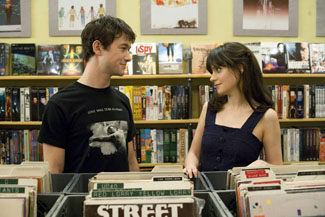|
|
I Was Robbed: (500) Days of SummerBy Anthony DaquanoJune 10, 2010
On the other hand, while Tom remains idealistic about love, Deschanel perfectly represents Summer, who remains idealistic about living a whimsical, independent life. Summer doesn't want to break Tom's heart, nor remain oblivious to why Tom hurts, but regardless of intent she does. Yet, because Deschanel knows her character so well and respects her character, we don't doubt her obliviousness to Tom's ardor and his pain. We also can't help but be drawn to this precocious woman with an affinity for The Smiths and running around Ikea. Upon second viewing, one begins to pick up the lost signals that Tom missed as well, a frown here and a moment of boredom there. Summer is a girl who likes taking life from moment to moment, enjoying the randomness that is thrown her way. For a while, Tom serves that purpose, but like many relationships, those moments die out as the weeks and months wear on. Summer grows tired of something that was once exciting, while Tom clings on to a hope and memory that no longer exist. And when Summer does find her love, Deschanel presents as a different character. She seems more mature and self-assured than the girl that lived moment to moment. Both Gordon-Levitt and Deschanel were supported strongly by a screenplay that was also robbed of a nomination. Scott Neustadter and Michael Weber's screenplay isn't nearly as unconventional as some would like to make it to be, but by crafting real characters in real situations, the writers elevate the material beyond romantic comedy. They present a relationship as it really is - a random memory of different events that is difficult to put together than a linear narrative. Both Deschanel and Levitt pick up on this and help create a story and characters that were wrongfully shunned by the Academy.
|

|
|
|

|
Friday, May 17, 2024
© 2024 Box Office Prophets, a division of One Of Us, Inc.


